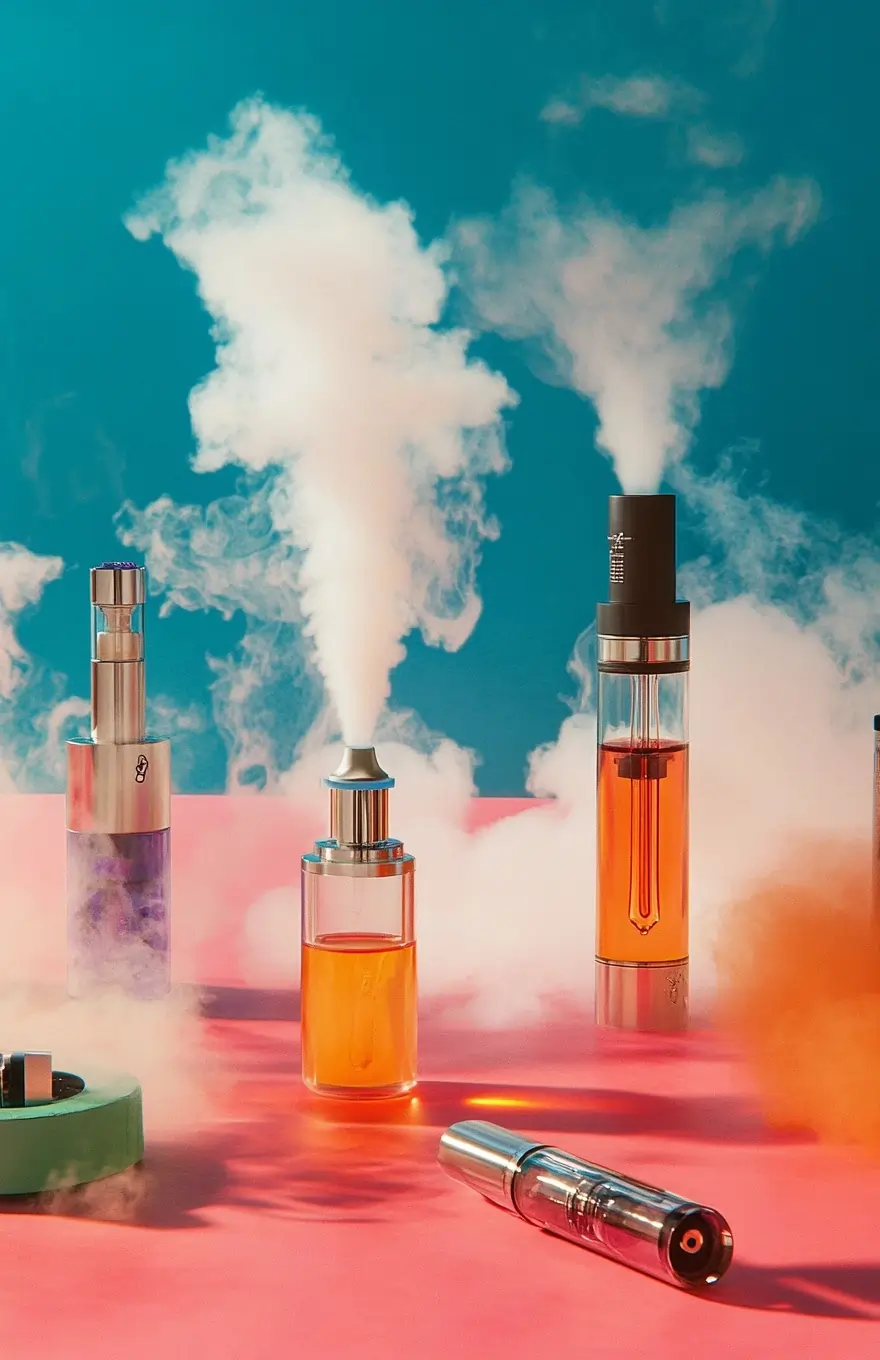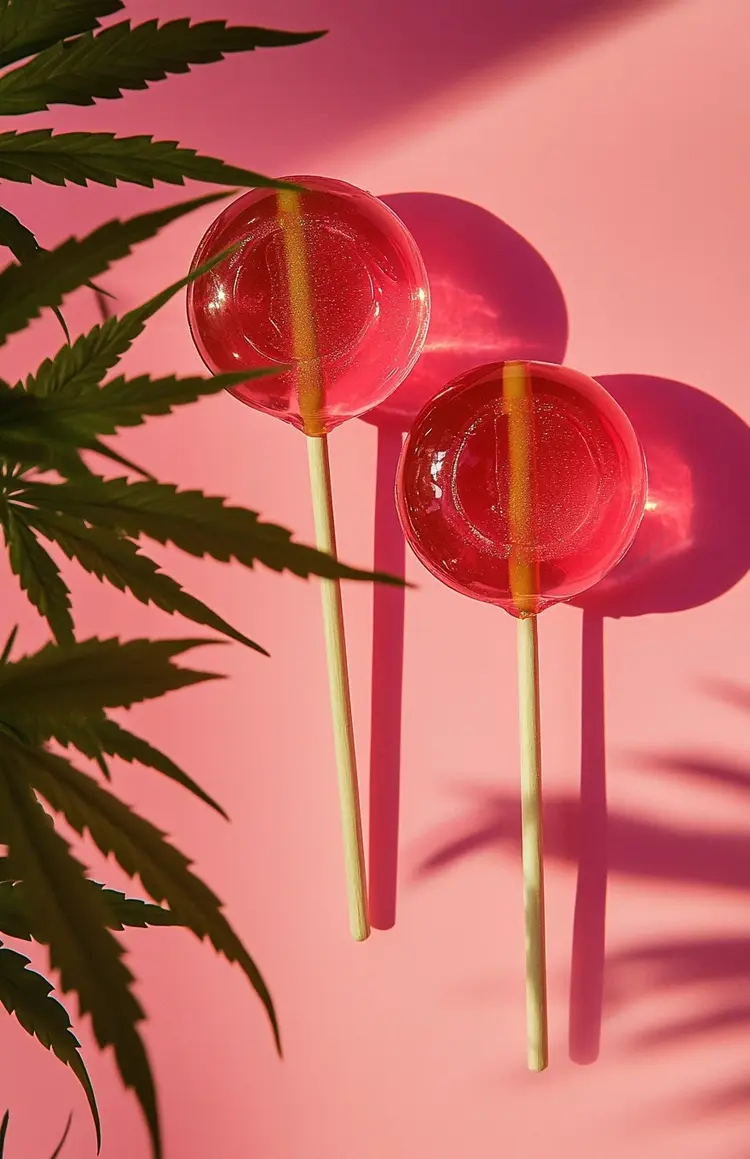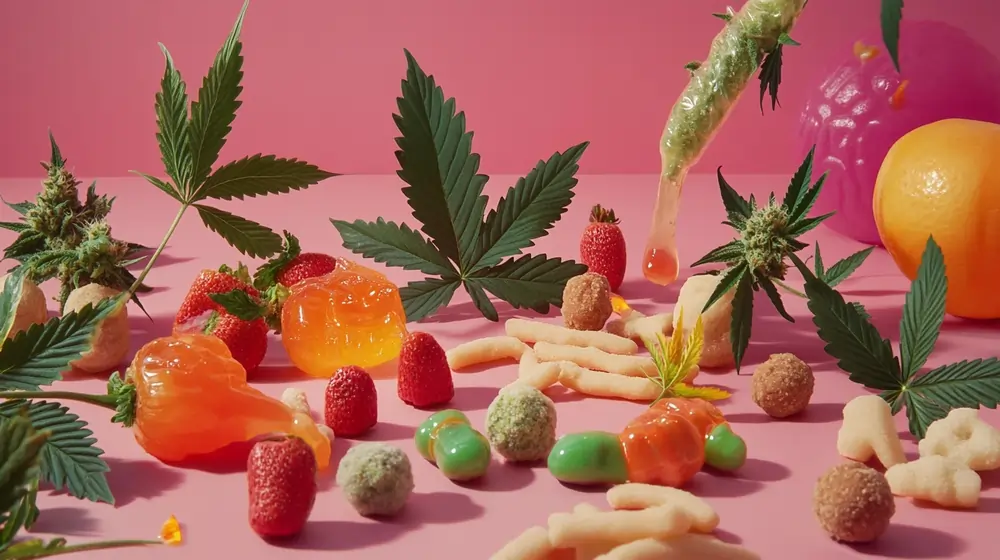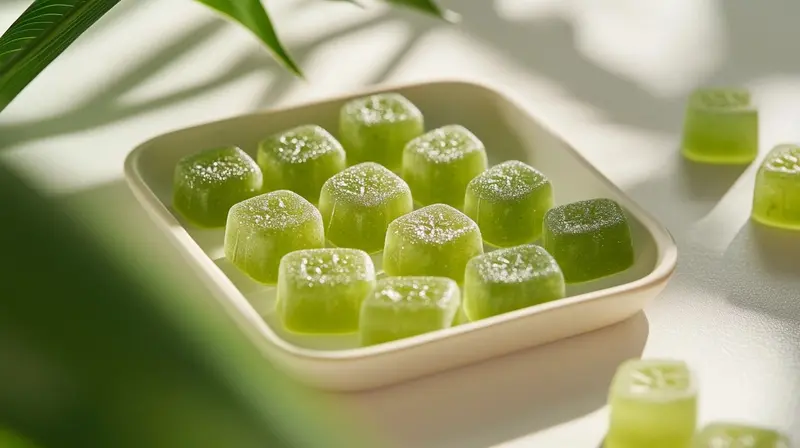

If you’re asking, “Are edibles illegal?” the answer isn’t a simple yes or no. It’s more like walking a legal tightrope. In some states, you can snack on THC gummies without a care, while in others, it’s like carrying a bag of trouble.
Federal law? It’s a whole other beast, creating even more confusion. Whether it’s cannabis-infused baked goods or THC gummies, knowing the rules can potentially save you from criminal charges. Let’s cut through the noise and figure out where edibles stand in terms of legality.
Cannabis edibles are more than just the classic brownies. They’re any food or drink infused with cannabis.
These products pack the psychoactive compound THC (tetrahydrocannabinol) or other potent cannabinoids like CBD (cannabidiol) into a tasty, discreet form. From gummies to baked goodies, edibles offer a smoke-free way to experience the wonders of the cannabis plant.
What makes them stand out? They don’t kick in instantly. Instead, edibles go through the digestive process, often bringing stronger and longer-lasting effects. They open up a whole new world of cannabis consumption, whether you’re after recreation or medical use.

Edibles aren’t one-size-fits-all. They come in a variety of forms, each offering a unique experience for enthusiasts. Let’s go through each one:
Related Article: Types of Edibles
Edible products hit differently, literally. Unlike smoking cannabis, which provides near-instant effects, edibles take their sweet time. The active ingredient, usually THC or CBD, goes through the digestive system, creating slower but much stronger effects. This means you’ll wait longer for the effects to kick in, but when they do, the experience lasts for hours.
Compared to vaping or smoking, ingesting cannabis edible products often feels more intense, thanks to how your body metabolizes cannabinoids. They’re also discreet. No smoke, no smell, just you and your favorite treats. But be careful! Eating too much too fast can quickly turn fun into “too much THC” territory.
The legality of edible products in the U.S. is a total patchwork. While some states have fully embraced cannabis use for recreational and medicinal purposes, others still treat edibles like contraband.
On the federal level, the legalities are clearer. THC-infused edibles are illegal under federal law, regardless of state policies. However, hemp-derived edibles with less than 0.3% THC are federally compliant under the 2018 Farm Bill.
Sound complicated? That’s because it is. The legality of edible products hinges on where you are and what’s in them.
The federal government doesn’t mess around when it comes to edible products. Under the Controlled Substances Act, THC-infused goods sourced from marijuana, regardless of form, fall under illegal drugs.
Hemp-derived edibles with less than 0.3% THC, on the other hand, get a pass under the 2018 Farm Bill. But here’s the catch: If an edible’s THC content crosses that line, it’s game over. Federal regulations are strict, so understanding these rules can save you from potential criminal charges.
State rules are all over the place when it comes to edible products. In states like California and Colorado, cannabis-infused treats are legal for recreational and medicinal use. Meanwhile, in stricter states like Texas, edibles with THC can land you in serious trouble.
Some states allow only CBD products, while others completely ban anything cannabis-related. The rules depend on what state or territory you live in.
Knowing your state’s stance on edibles can make or break your plans. Always check local laws before indulging in any type of CBD or THC edible.
Try our interactive state-by-state Edible Legality Map.
THC and CBD edibles live in two very different legal worlds. THC edibles, like gummies or baked goods, are often restricted to states where recreational or medical use is legal. Meanwhile, CBD edibles derived from hemp are federally compliant under the 2018 Farm Bill as long as they contain less than 0.3% THC.
The key difference? THC edibles can produce psychoactive effects, while CBD edibles focus on relaxation without the euphoric sensation. This difference not only impacts how they’re used but also determines their legality. Understanding these distinctions is vital before purchasing or possesing any edible goods.

International policies around cannabis-infused edibles are as varied as the countries themselves. In Canada, they are legal nationwide, thanks to their progressive regulations. Across Europe, however, the rules are a mix. Some countries allow CBD edibles, while others ban all cannabis-infused products.
Regulations in places like Asia or the Middle East are notoriously strict. Possession and consumption of edible products can result in severe penalties.
The global landscape is constantly shifting, so if you’re traveling, it’s crucial to know the guidelines for your take-off location and destination. A little research can save you a lot of trouble.
Canada is ahead of the game when it comes to cannabis edible products. Thanks to nationwide legalization in 2018, they are not only allowed but also heavily regulated to ensure quality and safety. You’ll find everything from THC-infused gummies to baked goods on store shelves, all with strict THC content limits.
Consumers can legally purchase edible products through licensed retailers, but unregulated products are still off-limits. Whether for medical use or recreation, Canada’s straightforward approach makes it one of the most progressive countries for edible lovers.
Europe’s stance on edible products is all over the map. Countries like the Netherlands are more relaxed, allowing THC edibles in designated coffee shops. Meanwhile, places like France or Sweden strictly prohibit anything with THC, though CBD edibles are widely accepted across much of the continent.
Each country has its own rules. Even within the European Union, there’s no single standard. While CBD-infused products are more widely available, THC edibles remain highly restricted in most areas. Always check local regulations before bringing cannabis-infused treats into your travel plans.
Hollyweed’s edible offerings are all about quality, flavor, and unforgettable experiences. Whether you’re a seasoned cannabis lover or just curious, we’ve got the perfect treats to satisfy your vibe. Here’s a quick rundown of some of our federally legal must-try options:
Check out our online shop, where you’ll find these and other exciting edible options, such as Delta-8 Tinctures, special Amanita and Blue Lotus Gummies, and more. Whatever your vibe, just take your pick!
Hollyweed isn’t just another cannabis brand. We’re your top choice for premium, trustworthy edible products. We craft every item with care to deliver flavor, consistency, and results you can rely on. Here’s what sets us apart:
Are you curious about edibles? From legality to proper consumption, there’s plenty to unpack. In the sections below, we’ll discuss some of the most common concerns, giving you the clarity you need to enjoy your tasty treats with confidence.
Traveling with edible products is tricky business. In states or countries where cannabis is legal, you might be able to bring them along, but only if they meet local guidelines.
Crossing state or international borders with THC edibles? That could land you in serious trouble, especially since federal rules still consider them illegal. For hemp-derived CBD treats, you’ll generally have an easier time but always double-check local and airline policies.
Keeping the products in their original packaging helps avoid confusion. When in doubt, leave them at home to stay on the safe side.
Yes, there are strict age limits for buying edible products. In states where recreational marijuana is legal, you typically need to be at least 21 years old to make a purchase. For medical marijuana patients with prescription medications, the minimum age can drop to 18, but only with a valid medical card.
Hemp-derived CBD edibles have fewer restrictions, and in some cases, you can buy them if you’re 18 or older. Always check your local rules to know the age requirements before hitting up your favorite dispensary or shop.
Getting caught with illegal edibles can lead to serious trouble. Depending on the state, penalties can range from hefty fines to a third-degree felony, drug conviction, or even a prison sentence. Factors like the amount of THC, total weight of the edibles, and intent to distribute can all influence the severity of the punishment.
Unintentional possession, like carrying edibles across state lines without realizing the law, won’t get you a pass. You could still face criminal charges or community supervision.
To stay safe, always double-check local laws and keep any edibles in their original packaging. Better safe than sorry!

The answer depends on where you are and what’s inside those treats. While some places embrace cannabis-infused edibles for recreational or medicinal purposes, others still view them as off-limits. Federal guidelines can complicate things further, especially with THC content in question.
Knowing the rules, whether you enjoy gummies, baked goods, or other edibles, can save you from serious issues. Stay informed, follow local laws, and make smart choices to keep your cannabis experience stress-free. Legal or not, edibles demand a little research before you indulge.